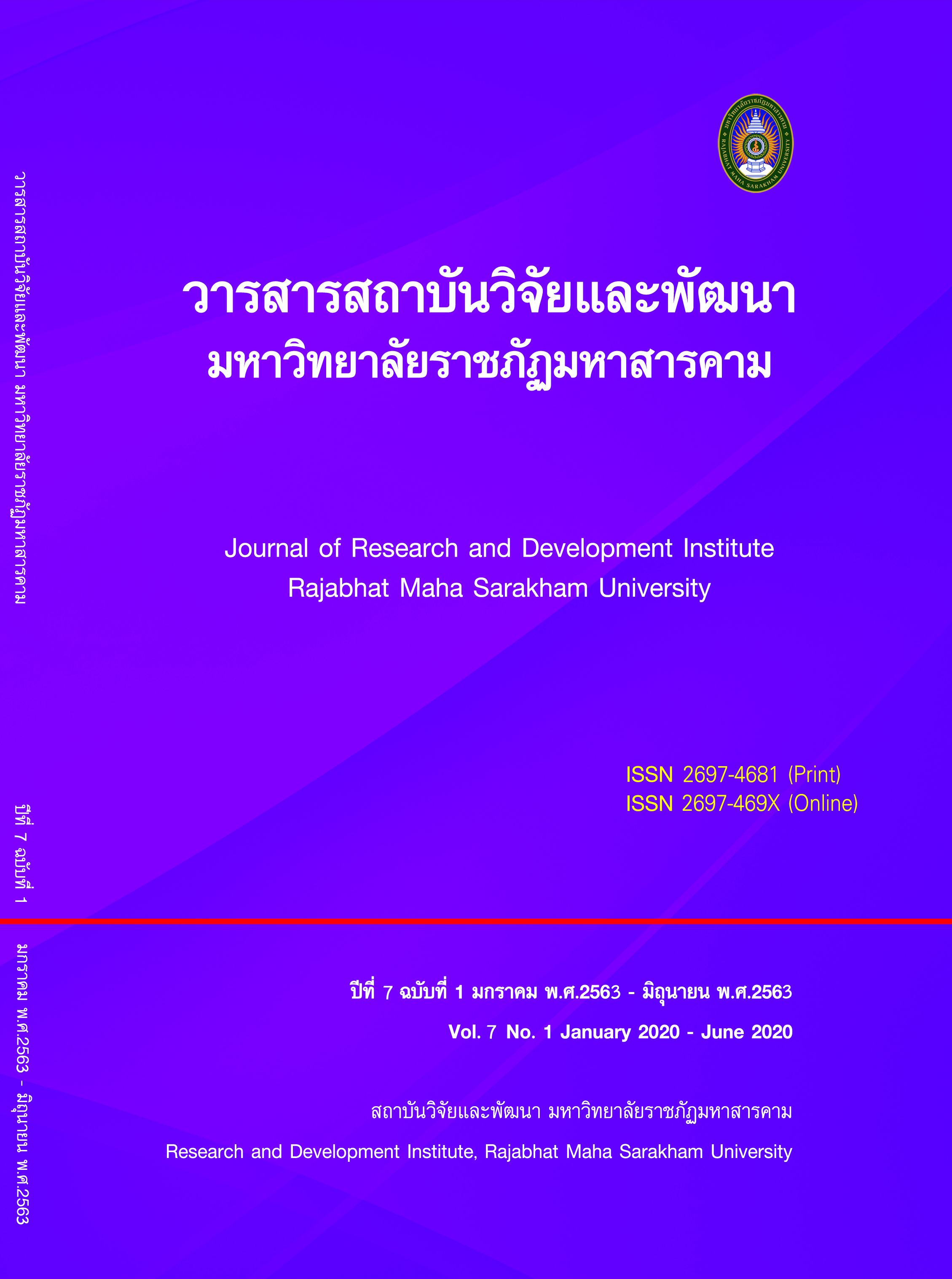การจัดการทรัพยากรมนุษย์เพื่อความเท่าเทียมกันของบุคคลากรผู้มีความแตกต่างทางเพศสภาวะเพื่อลดความขัดแย้งในองค์การการบริหารส่วนจังหวัดเพชรบุรี
คำสำคัญ:
การจัดการทรัพยากรมนุษย์เพื่อความเท่าเทียมกัน, ผู้มีความแตกต่างทางเพศสภาวะ, ความขัดแย้ง, องค์การการบริหารส่วนจังหวัดเพชรบุรีบทคัดย่อ
การศึกษาครั้งนี้มีวัตถุประสงค์เพื่อศึกษา (1)สถาณการณ์การยอมรับบุคคลากรผู้มีความแตกต่างเพศสภาวะในประเด็นการจัดการทรัพยากรมนุษย์ในองค์การการบริหารส่วนจังหวัดเพชรบุรี(2)ปัจจัยและบริบทที่มีผลต่อการจัดการทรัพยากรมนุษย์เพื่อความเท่าเทียมกันของบุคคลากรผู้มีความแตกต่างทางเพศสภาวะ(3)ผลกระทบด้านการจัดการทรัพยากรมนุษย์หากมีการปฏิบัติอย่างไม่เป็นธรรมต่อบุคคลากรผู้มีความแตกต่างเพศสภาวะในองค์การบริหารส่วนจังหวัดเพชรบุรี
วิธีดำเนินการวิจัย ใช้ระเบียบวิธีเชิงคุณภาพ โดยเก็บข้อมูลจากการรวบรวมเอกสารหลักฐาน การสังเกตแบบไม่มีส่วนร่วม และการสัมภาษณ์เชิงลึก กลุ่มผู้ให้ข้อมูลสำคัญ ได้แก่บุคคลากรผู้มีความแตกต่างเพศสภาวะ ในองค์การบริหารส่วนจังหวัดเพชรบุรี จำนวนทั้งสิ้น 13 คน วิเคราะห์ข้อมูลโดยใช้การวิเคราะห์แก่นสาระ
ผลการศึกษาพบว่า(1)สถาณการณ์การยอมรับบุคคลากรผู้มีความแตกต่างเพศสภาวะอยู่ในสภาวะที่ดี ด้านผู้บริหารองค์การบางรายมีอคติต่อผู้ที่มีความแตกต่างของเพศสภาวะ ในด้านการจัดการทรัพยากรมนุษย์ขององค์การ พบว่า กลุ่มตัวอย่างเกือบทั้งหมดได้รับการปฏิบัติจากผู้บริหารองค์กรอย่างเท่าเทียมและเป็นธรรม (2)ปัจจัยและบริบทที่มีผลต่อการจัดการทรัพยากรมนุษย์เพื่อความเท่าเทียมกันของบุคคลากรผู้มีความแตกต่างทางเพศสภาวะได้แก่ การรับเข้าทำงาน การเข้าสู่ตำแหน่งในระดับสูง การได้รับโอกาศในการพัฒนาตนเองด้านการฝึกอบรม ( 3)ผลกระทบด้านการจัดการทรัพยากรมนุษย์จากการปฏิบัติอย่างไม่เป็นธรรมต่อบุคคลากรผู้มีความแตกต่างเพศสภาวะในองค์การบริหารส่วนจังหวัดเพชรบุรี ได้แก่ความก้าวหน้า ในการ รับราชการที่ไม่ทัดเทียม กับข้าราชการ เพศชาย หรือเพศหญิง โดยเฉพาะการเข้าสู่ตำแหน่งบริหารระดับสูง
เอกสารอ้างอิง
References
Chaiwat Wongsa-ngam. (2008). The value of a person lies in the outcome of the work. Labor Journal. [Online] http://oknation.nationtv.tv/blog/wongsangam/ 2008/05/21/entry-2. [20 October 2019]
Cummings, T. G. & Worley, C. G. (2005). Organization Development and Change. 8th edition. San Francisco: South-Western. P.29-36
Galas, J. (1996). Gay Rights. San Diego, California: Lucent Books. P.143-178.
Halperin, D. (2000). “How to Do the History of Male Homosexuality GLQ”. A Journal of Gay and Lesbian Studies. 6: 87-124.
Miller, N. (1992). Out in the World: Gay and Lesbian Life from Buenos Aires to. Bangkok. London: Penguin Books.
Montra Pongnil. (2008). Bisexual in the university: the diversity of gender identity. In the 1st annual meeting report, Sexuality Education in Thai Society, topic: Critical knowledge and traditions on sexuality education in Thai society. Thawatchai Phachun and Pimpawan Boonmongkol, editors. Bangkok: Charoen Dee Printing House.
Remaficli, G. I. (1985). Adolescent Homosexuality (Issues for Pediatricians.). Clinical. Pediatrics. 24 (September): 481-485.
Robbins, S. P. (2005). Organizational behavior: Concepts, controversies, and applications. 11th edition. Englewood Cliffs, NJ: Prentice-Hall
Snyder, K. (2006). The G Quotient: Why Gay Executives are Excelling as Leader and What Every Manager Needs to Know. New York: Jossey-Bass.
Sulaiporn Chonwilai. (2001). Women love women: women of being "other". In marginalized life: identity and meaning: case studies, gay men, women love, old people, garbage collectors, teenagers, Street children. Pritta Chalermpao Koanantakul, Editor, Bangkok:
Sullivan, G. & Leong, L., eds. (1995). Gays and Lesbian in Asia and the Pacific: Social and Human Services. New York: Harrington Park Press.
Surapong Sothanasathien, and Potjana Thoobkaew. (2006) Communication for the management of gay organizations in Thailand. Bangkok: Research Fund Office.
Surichai Wankeow. (2007). Marginalized: from thought to truth. 2nd edition, Bangkok: Active Print Co., Ltd.
Theodorakopoulos, N., & Budhwar. (2015). “Guest Editors' Introduction: Diversity and Inclusion in Different Work Settings: Emerging Patterns, Challenges, and Research Agenda”. Human Resource Management, 54 (2), 177-197.
Thiamthep Thangsiri. (2003). Kathoei student identity: a case study of students in a secondary school of Chiang Mai province. Master of Arts Thesis (Research and educational statistics). Chiang Mai: Chiang Mai University.
Tihoma Ohyanen. (2008). Sexuality and Culture in Counseling and Psychotherapy: Starting a Case Study in Thailand. In the 1st annual meeting report, Sexuality Education in Thai Society, topic: Critical knowledge and traditions on sexuality education in Thai society. Thawatchai Phachun and Pimpawan Boonmongkol, editors. Bangkok: Charoen Dee Printing House.
ดาวน์โหลด
เผยแพร่แล้ว
รูปแบบการอ้างอิง
ฉบับ
ประเภทบทความ
สัญญาอนุญาต
บทความที่ได้รับการตีพิมพ์เป็นลิขสิทธิ์เป็นของผู้ประพันธ์บทความ







